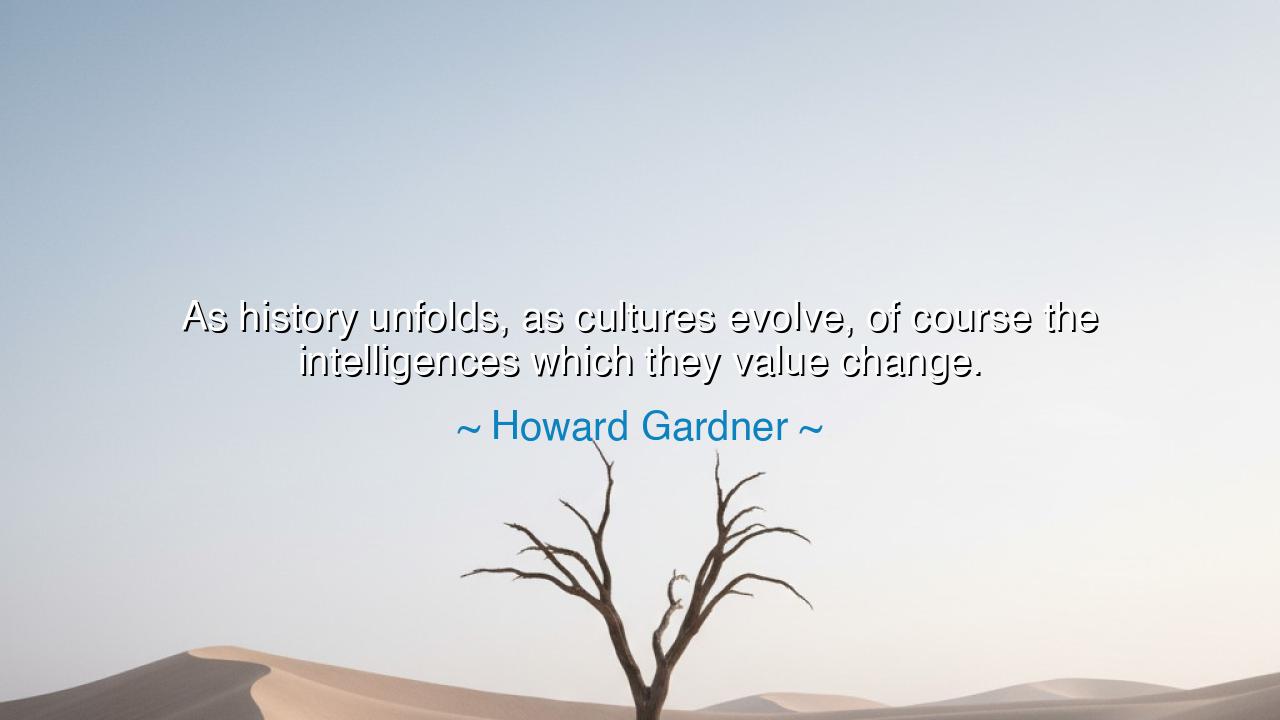
As history unfolds, as cultures evolve, of course the
As history unfolds, as cultures evolve, of course the intelligences which they value change.






In the words of Howard Gardner, the scholar who reshaped our understanding of the human mind, there is a truth both humble and eternal: “As history unfolds, as cultures evolve, of course the intelligences which they value change.” These words are not the cold observation of a scientist; they are the wise reflection of one who has gazed deeply into the patterns of civilization. Gardner, known for his theory of multiple intelligences, reminds us that intelligence is not fixed like a monument, but fluid like a river — shaped by the land it passes through, reflecting the skies of its age. As humanity changes, so too does its measure of wisdom, skill, and worth.
The origin of this insight arises from Gardner’s lifelong study of the ways humans think, create, and learn. In his groundbreaking work Frames of Mind, he challenged the narrow belief that intelligence could be measured by a single number — the IQ — and declared instead that there are many forms of intelligence: linguistic, musical, spatial, kinesthetic, interpersonal, and more. But here, in this quote, he speaks not of the individual alone, but of civilization itself. He observes that as history unfolds, what a culture values as “intelligent” — what it praises, rewards, and teaches — changes with time. The warrior’s strength, once the pinnacle of intelligence, gave way to the philosopher’s thought, the craftsman’s precision, the scientist’s curiosity, and the artist’s imagination. Humanity’s measure of greatness evolves with its needs and dreams.
In the ancient world, wisdom was the highest intelligence. The Greeks sought truth through philosophy; the Chinese revered the sage who balanced action and reflection; the Indians honored the seer who grasped the eternal. To be wise was to live in harmony with the cosmos. But as ages turned, the Industrial Revolution dawned, and a new kind of intelligence — logical, mechanical, mathematical — rose to prominence. The age of machines demanded the mind of the engineer, not the mystic. And in the modern world of digital networks and artificial minds, we have come to value creativity, adaptability, and emotional understanding. Gardner’s insight reveals that each age invents its own idea of the “intelligent” person — the one best suited to survive and to lead within its particular story.
Consider the tale of Leonardo da Vinci, the Renaissance man who stood at the crossroads of art and science. In his time, the culture of Europe was awakening from medieval darkness into a new light of discovery. Leonardo’s genius would not have flourished in an earlier age that prized obedience over imagination. But in the flowering of the Renaissance — a culture reborn to the value of curiosity, observation, and beauty — his intelligence became the emblem of human potential. Had he lived in a different era, his gifts might have gone unnoticed, buried beneath the soil of history. Thus, Gardner reminds us that intelligence is not only within the person, but within the moment — it is the meeting of mind and era, of talent and opportunity.
And yet, his words also carry a warning. For when a culture defines intelligence too narrowly, it blinds itself to the richness of human potential. How many artists were once dismissed as foolish? How many children, whose strengths lay beyond the classroom’s rigid rules, were told they were slow or dull? Gardner’s wisdom calls us to broaden our vision — to recognize that what we call “smart” is but a reflection of our own time and its biases. In an age obsessed with technology, we risk forgetting the intelligence of the heart, the empathy that binds us, the creativity that heals us. Cultures rise when they honor all forms of mind — and fall when they exalt only one.
Therefore, my listener, take this as a teaching for your own life: do not measure your worth by the standards of the age alone. The world will always shift, and its measures of intelligence will change like the tides. What seems undervalued today may be treasured tomorrow. The poet, the philosopher, the craftsman, the nurturer — all hold forms of genius that no machine can replicate. Cultivate your unique intelligence, and respect the variety of gifts that others bear. For humanity’s greatness lies not in uniform brilliance, but in diversity of thought.
As Howard Gardner reminds us, the story of intelligence is the story of our species — ever-changing, ever-growing. The key is not to cling to the old definitions, but to evolve with grace, carrying forward the wisdom of the past while embracing the needs of the present. Let each age teach you what it values, but let your spirit remain free to define its own measure. For intelligence is not merely the power to think — it is the courage to adapt, the curiosity to learn, and the compassion to understand what it means to be human. And as long as humanity endures, this evolution — this unfolding of the mind — will be our greatest history.






AAdministratorAdministrator
Welcome, honored guests. Please leave a comment, we will respond soon